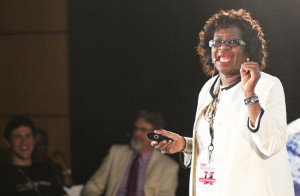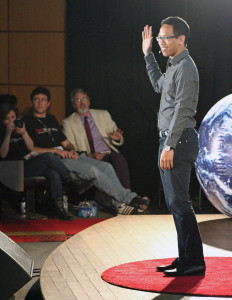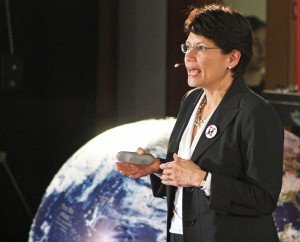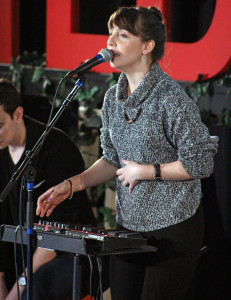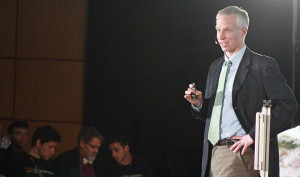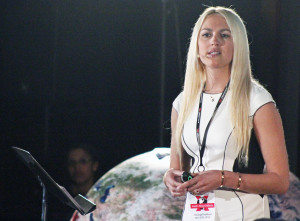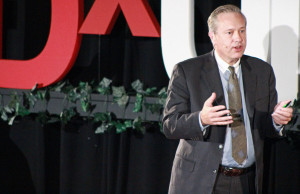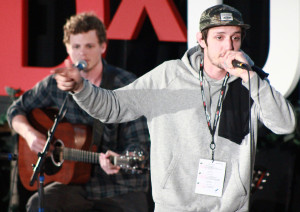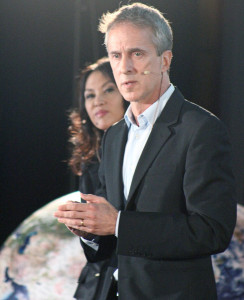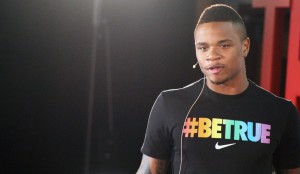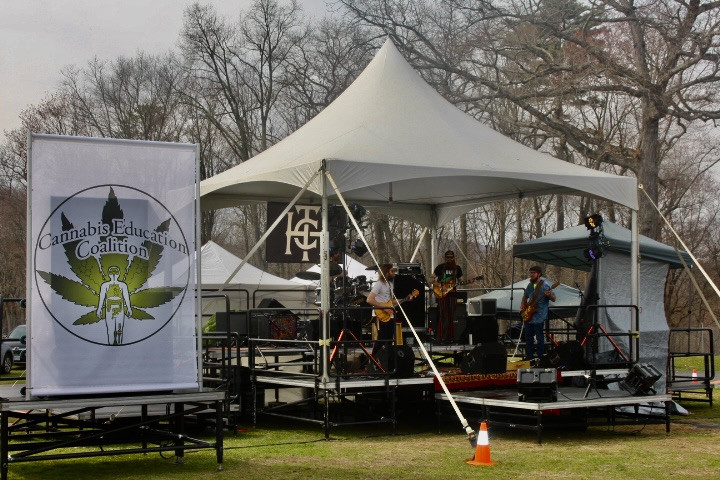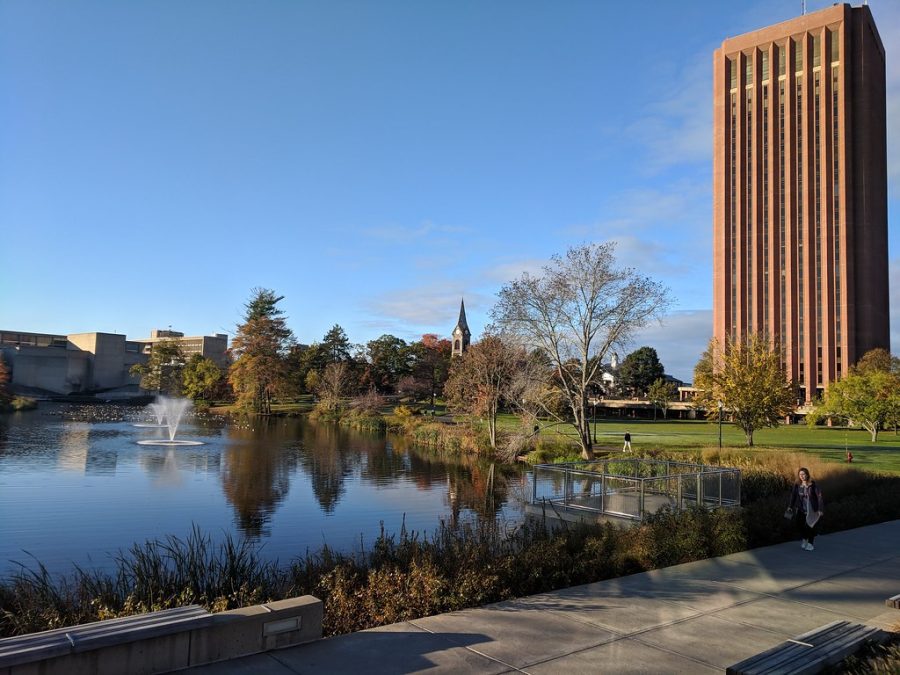by Jessica Troland
On a Sunday morning, UMass lies still. Students recuperate from the previous nights festivities and campus is calm, it’s only inhabitants are the birds in the trees and a few library die-hards. But on this Sunday, those sleeping students have risen early. They’ve dressed in their Sunday’s best and they’ve lined the halls of Isenberg in patient excitement, because today is April 27, 2014. Today is TEDxUMassAmherst.
Not even the caffeine from the coffee being guzzled could create a buzz as strong as the one in the Isenberg atrium as 500 guests filed through the waiting lines to receive their name tags – the TEDx equivalent to a golden ticket. One hour later, every seat of Mahar is filled, lights are dimmed, and the second annual TEDxUMassAmherst event has begun.
Scroll down for a brief summary each speaker, or to find your favorite
“Play is not reserved for the sandbox” – Steve Gross, Life is good Playmakers
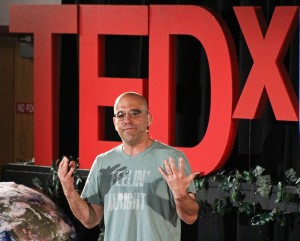
“I play for a living,” is how Steve Gross described his job as he bounced around the TEDx stage, exuberantly speaking with exaggerated hand motions. The Founder and Chief Playmaker at Life is good Playmakers has traveled the world working, and playing with, children in the direst of situations. Among them are children who have survived national tragedies such as the Newtown school shootings, as well as natural disasters which include the Haiti earthquake of 2010 and the devastating hurricane Katrina in 2005.
“I get to work with kids who’s lives are heartbreakingly difficult, and what I’ve learned from them is that they’re superheroes,” said Gross.
Gross’s presentation was the first in the morning program based on “Potential,” which focused on making the world a safer, better place for the generations to come, specifically with women and children in mind. Gross’s main theme was playfulness, which stemmed the question of how do we live playfully in our world today. The answer, Gross says, takes shape in four simple steps: Active engagement, internal control, social connection, and joyfulness.
“Can we be here now?” was Gross’s next question to the audience as he explained the concept of active engagement.
“We can reach our playfulness potential if we can be here now,” he said.
Gross encouraged audience members to have faith in themselves as a means of conquering the idea of internal control.
“I got this, I am strong, I am capable,” he reminded the audience, before also adding the incorporation of social connection.
“The quality of a person’s life is in direct proportion to the relationships in our life,” he said, encouraging audience members to cherish the relationships they form and to never stop enhancing them.
In closing, Gross left the audience with one more piece of heartfelt advice, “When we are engaged, we are not working, we are playing, and my wish for all of us is that we never stop playing.”
“It’s about collaboration” – Jackie Weatherspoon, Former Member, New Hampshire House of Representatives
Jackie Weatherspoon is a well-spoken woman of the world. It could be due to her State University of New York System (SUNY) college education. It could be due to her Harvard graduate education, which she accepted after declining a four year scholarship in her undergraduate years, or it could be due to the fact that Weatherspoon is a former member of the New Hampshire House of Representatives. She has traveled the world in her efforts to mend torn African governments in hopes of bettering life for women and children in the impoverished African countries.
“Women’s rights are human rights,” she said to the crowd as she flicked through a slideshow of photos, all showing women from around the world coming together to solve governmental issues in a war-torn Africa.
“It’s about collaboration. There is no way you can tell the people of the world you have the answers for them,” she said.
In her best example of collaboration, Weatherspoon spoke of her time in Africa. The village that was hosting her, which was once tormented by war, was now a safe-haven thanks to Britain. Weatherspoon, who was staying in a home with running water, noticed the women from the village coming to her house and taking her water. After a few days, she asked for the water to be turned off. It was then that she realized, this water, flowing so freely from her home, was a life source for this village, and these women were her unspoken protectors. Collaboration at it’s finest.
“Ladies and gentlemen,” Weatherspoon said as she came to her closing remarks, “All of you here in this room, women’s rights are human rights. Stand up, you belong here. We need you. Join the collaboration.”
“Speak ourselves into existence” – David Ke, Student Speaker
David Ke does not have a bellowing voice, or the ecstatic energy of a modern day rock star. His set has no props and his attire has no embellishments, but when he walks onstage and begins to recite his poem “Time,” the entire room falls to a hush.
David Ke is a first generation college student and a senior at UMass Amherst and on this Sunday morning, he stands on the TEDx stage as the winner of the Student Speaker Competition.
“Use anger and fill it with passion,” said Ke, who spoke of his experiences with racism, abuse and being raised in a family of Cambodian refugees. Today, Ke has transformed the pains of his past into art, using poetry and theater to express himself and create change in the lives of youths who face similar situations.
“What we need is love,” he said, “We need to love each other, love our brothers, love our sisters, love the random strangers on the street.”
Ke encouraged audience members to use art to express themselves, while also addressing the lack of social acceptance when it comes to speaking of personal , such as abuse.
“We don’t talk about it. Let’s talk about it. You have the choice in yourself to not talk about it till you feel that safe space,” he said, “We can create social change by story telling, you see.”
“How can we change the world? How can I help the we?” were his final questions as he brought his presentation to an end, all the while hammering the power of speech into the minds of his peers and audience members.
“We need to speak ourselves into existence,” he said.
“Science is all about repetition” – Dr. Katherine Luzuriaga, Time 100 Most Influential People 2013, HIV Researcher
Mother to child transmissions is the highest cause of HIV, according to Dr. Katherine Luzuriaga. So when transmission was virtually wiped out in the western hemisphere through the usage of AZT, a drug used to slow the progression of AIDs and HIV, it became mandatory for pediatricians to not only find a way to prevent transmission, but to treat children who have been diagnosed with AIDS early on. Luzuriaga has found a way.
In 2013, Luzuriaga named one of Time Magazine’s 100 most influential people in the world. Her success: curing an infant of HIV.
When an expecting mother came into one of her past clinics and tested positive for HIV, Luzuriaga knew there was no time for treatment before delivery. Previously, Luzuriaga had treated mothers-to-be with a series of anti-retroviral treatments, allowing the chances of transmission to decrease drastically, if not completely deteriorate. This instance left no time for treatment and as a result, transmission of the disease could not be prevented. The baby was born HIV positive and immediately treated with three different drugs at a high treatment rate between the period of 30 hours and 18 weeks. At 18 weeks, the mother was forced to leave the clinic due to social reasons.
After 23 months of no care, the mother returned to the clinic, where the baby was tested. No traces of HIV were found. The infant has since remained off treatment and traces of HIV have yet to be found in its testing results.
Since the infant’s case, many more children who once had HIV have been cured.
“We call it remission, for now,” said Luzuriaga humbly, “But science is all about repetition.”
“This song is about my grandma and it’s called ‘Whiskey’” – Julia Easterlin
“Prrr-rap- ta-ta- mm-ta-ta” are the first sounds into the microphone.
Snap-snap, clap-clap are the second. Then come the “Mm’s” and the “Oo-ah’s.”
A minute later, the prrr-raps, snaps and oo’s are looped and layered and Julie Easterlin – accompanied by Charlie Van Kirk on a single drum – has created a musical melody unlike anyone in the room has heard before. The sound is deceiving, giving the impression that Easterlin has come with five other singers, and some instruments, but the stage is set, and all illusions proved false. It’s just Easterlin and her looping machine.
“Go straightaway I gotta meet my lover at the station/ Don’t tell nobody, oh this is just between me and you,” cooed the singer as she endlessly added harmonies to her original song.
A graduate of Berkeley College of Music, she is a trained classical pianist and jazz vocalist – which is evident with her effortless vocal trills and improvisations. Aside from a Berkley education, her musical resume included performing at Chicago’s Lollapalooza music festival, as well as CollegeMusicJournal festival in New York and South by Southwest in Austin, Texas. Her first piece, titles “Go Straightaway” is upbeat, with her clear, crisp, youthful voice flipping and twirling over her jazzy layered effects.
“This next song is about my grandma, and it’s called ‘Whisky,’” she said as the room once again went silent with anticipation. “Whiskey” song began with silence, as all music does, and slowly evolved into a new musical treasure, this time layering “do’s” “la’s” and “da’s” over the snaps, floating onwards and upwards into the room, as audience members clapped along before roaring with a final applause.
“Think about fundamentals” – Professor Al Crosby, Geckskin Developer, Polymer Scientist, UMass Amherst College of Natural Science Professor
When UMass Professor and Polymer Scientist Al Crosby dangled his 42” TV from a glass panel using nothing but a strip of Geckskin, he used no precautions to break the fall in case the Geckskin failed. Perhaps a pillow or cushion to catch his flatscreen TV was simply forgotten, or perhaps Crosby knew there would be no need, because this time, Geckskin would work.
Geckskin, a draping adhesive developed in the labs of UMass Amherst, is inspired from and based off of the adhesion properties found in the toes of Geckos.
“We wanted to copy not only the material, but the attributes,” says Crosby, “The sustainability, the ability to hold high amounts of weight and let them go whenever they want.”
After many other attempts to mimic the adhesion abilities of Geckos by scientists from all over the country, Crosby and his team finally realized what they thought may be a solution: look beneath the surface.
Geckskin is capable of holding up to 700 pounds on any service, which Crosby demonstrated to the audience, first using Geckskin to hang 75 pound weight from a panel of glass. He also showed home video footage of his children using Geckskin to tape an iPad to the walls of their home – once again, over ceramic floors with nothing to break a potential fall.
“Think about the fundamental attributes and let the fundamentals lead. Look beyond the surface,” Crosby said.
“You must define your purpose. You must choose your perspective of how to view the world around you.” – Kaitlin Roig-DeBellis, Sandy Hook Elementary School Teacher
On December 14, 2012, the world as Kaitlin Roig-DeBellis knew it shattered.
The day began with a beautiful sunrise, light peering through the trees and filling her first grade classroom at Sandy Hook Elementary School in Newtown, CT with a cheerful glow. She snapped a photo and greeted her classroom of smiling children as they arrived one by one.
A few hours later, a gunman entered the school and committed one of the most tragic acts the country has ever witnessed.
“Our colorful, vibrant, bright, classroom had faded. Shots rang out as though we were in a war zone, and in that moment we had to choose hope, we had to choose faith ” said Roig De-Bellis.
From an early age, Roig De-Bellis had envisioned her classroom of smiling children. She practiced in front of a room full of stuffed animals, eventually working her way up to a bachelors and then masters degree in education.
“Teacher’s don’t just make the difference, they are the difference. Teacher’s are the common denominator of the world. We all start with school,” she said.
On December 14, 2014, Roig-DeBellis rushed her class of trembling first graders to safety in a bathroom as they waited for the gunshots to cease.
In the small bathroom of Sandy Hook Elementary, Roig-DeBellis’s carefully laid plan of the life she would lead fell to pieces.
As she recited her favorite quote form Robert Burns, Roig-DeBellis begged the audience to always hold onto love and to never let go of faith.
“The best laid schemes of mice and men often go awry,” she said, quoting Burns, “You are the one who holds the control of how you react in these situations. We must set our own course, we must hold onto love in the tough times, especially in the tough times,” she said.
The crowd erupted in a standing ovation.
“We can all have access to life-saving information” – Dr. C Michael Gibson, Harvard Medical School Professor of Medicine, Editor in Chief and Founder of WikiDoc
When Dr. C. Michael Gibson was a child living in the vast plains of Oklahoma, he bought his first international ticket, in the shape of a giant book.
“I bought an encyclopedia and went global,” said Gibson, who is a professor of medicine at Harvard Medical School, is also the editor in chief and founder of WikiDoc, an non-profit, online platform that works to make medical information accessible to anyone with Internet access.
“I never threw away a single note that I took,” said Gibson. To Gibson, the ideal textbook is free and that is exactly what he has set out to do with WikiDocs, which is now the world’s largest medical textbook and free for users across the globe.
“Today’s theme was freedom. Free to liberate that medical information from behind those politics so we can all have equal access to life-saving information,” he said.
“Every hesitation is a wasted precious second” – Tod Pritchet and Mic Stewart
The duo hip hop duo hails from Philadelphia and brings with them an eclectic mixture of urban sounds and inspirational lyrics.
With Pritchet on guitar and Stewart on vocals, the two performed “The World Today.”
“Every hesitation is a wasted precious second/ Go out and teach someone today,” Rapped Stewart .
As a closing song, the group performed their newest track “The Mark of the Beast.” Specifically written for the TEDxUMass Amherst event, the song reflects on summer in the city they call home.
“The summer’s coming don’t get caught in the heat,” Stewart said in rhythm, with Pritchet alongside strumming faster and faster on his guitar. Stewart soon broke out into a full-speed rap, never missing a beat or skipping a word as he poured every last ounce of his energy into the performance and onto the audience.
“Every child in this country should have the same equal chance to succeed.” – Amy Chua and Jed Rubenfeld, New York Times Bestselling Authors
When Amy Chua and her husband, Yale Law School Professor Jed Rubenfeld sit down to coffee in New Haven, CT, they don’t expect to be the topic of conversation at the adjacent table. But since the publishing of their most recent book, “The Triple Package” was released, the New York Times Bestselling authors have become more accustomed to hearing their names around town.
“Did you hear about that new book arguing that some races are more superior than others?” said the appalled fellow-coffee-drinker to the couple as they took their seats at the table next to her.
They had heard of a new book. Chau, New York Times Best-Seller from her previous book, Battle Hymn of the Tiger Mother, had recently co-written a new work with her husband, but their book had nothing to do with racial superiority.
“The Triple Package” is based on the theory that there are three qualities a persona can attain for success: superiority complex, insecurity, and impulse control. While having too much of any one of these qualities can be detrimental to a person’s success rate, an equal balance can shape a well rounded individual who is more likely to attain success, said the pair.
After conducting copious amounts of research, Chua and Rubendfeld noticed the theory continued to prove itself effective when they found that the generation and culture of a person had more to do with their success than their racial background.
“Every child in this country should have the same, equal chance to succeed. There should no longer be successful groups, or races, but only successful people,” the couple said.
“Life has changed for the better” – Derrick Gordon, UMass Amherst Men’s Basketball Starting Guard
“There was no way someone like me could be gay,” said the 6’3” UMass Men’s Basketball Starting Guard Derrick Gordon as he paced the TEDxUMassAmherst Stage.
This year, after months of inner turmoil, Derrick Gordon became the first Division I basketball player to be openly gay. With his university behind him, and the TEDxUMassAmherst audience in front, Gordon shared his journey in hoped of encouraging others to stay true to themselves.
“I felt like I was in a cage and people were just sticking me with needles,” said Gordon.
As he traced his steps back and forth, he begins to recall the days when he would call his mother at night, desperately wanting to reveal his sexuality to her but being too afraid of her reaction. Gordon’s voice began to shake. Then he stopped, put his hand over his eyes, and tried to regain composure.
“She didn’t know that I was crying myself to sleep every night,” he said.
Today, Gordon says his life has changed for the better, and hopes his story has helped to change those around him. His teammates, friends and family treat him just as they always have and his message has reached further than he had ever anticipated. Gordon recently received a tweet from Tyra banks, giving him support and just attended his first GLAAD Awards.
Jessica Troland can be contacted at [email protected]

